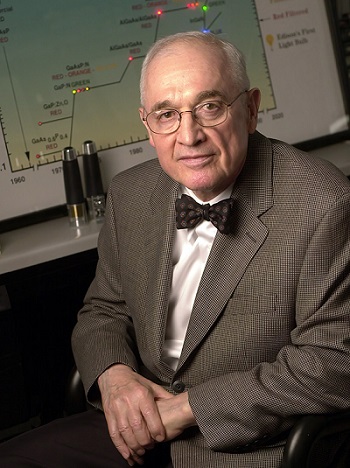
LED Pioneer Nick Holonyak Jr. Dies at 93
Nick Holonyak Jr., inventor of numerous photonic technologies, died Sept. 18 at the age of 93. The University of Illinois shared news of Holonyak’s death.
Holonyak is credited with the development of the first practical visible-spectrum LED, used worldwide in light bulbs, device displays, and lasers.
One of the earliest researchers in semiconductor materials and in the field of optoelectronics, Holonyak contributed to technologies in household dimmer switches, lasers that run CD and DVD players, fiber optic communication lines, and other electronics and communications devices. Two presidents recognized Holonyak with national medals — George W. Bush with the National Medal of Technology and Innovation in 2002 and George H.W. Bush with the National Medal of Science in 1990 for “his contributions as one of the nation’s most prolific inventors in the area of semiconductor materials and devices.”

Nick Holonyak Jr., credited inventor of the first visible spectrum LED, among other innovations, died Sept. 18 at the age of 93. Courtesy of the University of Illinois.
Holonyak received his bachelor’s, master’s, and doctoral degrees at the University of Illinois. He then worked for Bell Labs, the U.S. Army Signal Corps, and General Electric before joining the University of Illinois faculty in 1963.
At General Electric, Holonyak demonstrated the first visible-light emitting diode, in 1962. Infrared LEDs previously had been made of gallium arsenide, and Holonyak created crystals of gallium arsenide phosphide to make an LED that would emit a visible red light.
At the University of Illinois, Holonyak held the John Bardeen Chair in Electrical and Computer Engineering and Physics. Holonyak was Bardeen’s first graduate student, earning his doctorate at Illinois in 1954, and he worked closely with Bardeen, a two-time Nobel laureate, until Bardeen’s death in 1991. In 1977, Holonyak and his students demonstrated the first quantum-well laser, which is now used in fiber optics, CD and DVD players, and medical diagnostic devices.
More recently, Holonyak developed a technique to “bend” light within gallium arsenide chips, a development allowing computer chips to transmit information by light rather than electricity. With fellow Illinois professor and frequent collaborator Milton Feng, Holonyak developed the transistor laser, a transistor with both light and electric outputs that could enable next-generation high-speed communications technologies.
Among his numerous awards are the Queen Elizabeth Prize for Engineering (2021), National Academy of Engineering’s Draper Prize (2015), the Lemelson-MIT Prize (2004), the Global Energy Prize from Russia (2003), the Institute of Electrical and Electronics Engineers Medal of Honor (2003), the Japan Prize (1995), the National Academy of Sciences Award for the Industrial Application of Science (1993), and the Optical Society’s (Optica) Charles Hard Townes Award (1992).
Holonyak was a member of the National Academy of Engineering, the National Academy of Sciences, and the National Academy of Inventors, and a fellow of the American Academy of Arts and Sciences, the International Electrical and Electronic Engineering Society (IEEE), the American Physical Society, and the Optical Society of America. He was also a foreign member of the Russian Academy of Sciences.
Published: September 2022